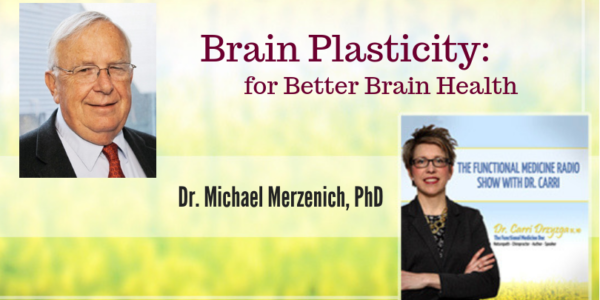Podcast: Play in new window | Download
Subscribe: Apple Podcasts | Android | RSS
In this episode of The Functional Medicine Radio Show, Dr. Carri’s special guest Dr. Michael Merzenich explains brain plasticity to improve brain health.
Dr. Michael Merzenich, PhD, is one of the scientists responsible for our current understanding of brain plasticity–the notion that the brain can change itself at any age. For nearly five decades, he and his colleagues have conducted seminal research defining the functional organization of the auditory and somatosensory nervous systems. Research on cortical plasticity conducted in his laboratory has greatly contributed to our current understanding of the phenomenology of brain plasticity across the human lifetime. Dr. Merzenich has received numerous prestigious awards and prizes for his research and holds nearly 100 patents for his work. He is a member of both the National Academy of Sciences and the Institute of Medicine. In 2016, Dr. Merzenich was awarded one of the world’s top neuroscience prizes, the Kavli Prize, for his achievements in the field of brain plasticity.
Main Questions Asked about Brain Plasticity:
- What is brain plasticity?
- Can you talk about the importance of feeding the brain properly and physical fitness for both body and the brain?
- How is BrainHQ different from some of the other online brain training programs?
- What does the research say about the benefits of brain plasticity?
- Can you explain the benefit of challenging your brain in different ways?
Key Points made by Dr. Merzenich about Brain Plasticity:
- The brain changes physically and functionally as you use it. It changes its wiring as you improve any ability or as you acquire any new ability. And those wiring changes, you could say that remodeling, really accounts for the origin of that ability or that improvement of ability, but it’s more than that because it’s not just changing its wiring. When you engage it, it’s also changing in a whole series of other physical ways that relate to your health.
- No matter what your situation, your brain gives you the great ability to be better or stronger, more capable tomorrow as compared to today, and significantly more capable a week from now or a month from now.
- You are in fact a work in progress. Wherever you are in this point of life, you are actually continually adapting, continually changing, hopefully growing.
- Your brain is plastic. You can do something about it. Get busy and work hard and try to work at driving yourself in an improving direction because you can improve your situation potentially a lot.
- BrainHQ engages the machine in ways that change the brain to improve its general powers.
- It’s always challenging. If it’s not challenging, nothing changes in your brain when you engage it. The brain is smart enough to know, in a sense, that it’s only going to change when it matters to it. It’s only going to change when you could say things are serious.
- With 5 or 10 or 15 or 20 hours of engagement in Brain HQ across the period of days, almost everyone will perceive positive changes occurring in their operational abilities in their life. And those changes are cumulative across time. It could make a major difference in your life and very substantially contribute to assuring that your brain is in a healthy state going forward.
- I like to compare my performance with the performance of the average 30 or 40 year old. I’m 75. So I like to compare myself with the performance abilities of a brain of a younger person. And as long as I keep myself there, I’m pretty confident that I’m in a substantially neurologically secure position. And over time, with effort, I’ve found that I can keep myself there.
- Research has proven that individuals over age 65 using the Double Decision program in BrainHQ ended up reducing driver caused traffic accidents by fifty percent. That’s pretty significant.
- The most important finding of these studies is that if people did this training for ten hours, and then a year later they trained for another two to four hours, and then two years later they trained for another two to four hours and now we look out seven years later and we find that in those individuals, the occurrence of the onset of dementia, of Alzheimer’s disease, was cut in half.
- Maybe we can manage brain health more routinely in ways that can keep people safe more or less indefinitely. That’s our dream. So what we’re now trying to do is we’re trying to tell people, “Calibrate. Act when necessary. Continue to calibrate. Continue to check yourself and to try to keep your brain operational on a level in which your performance is like the performance of a much younger person. Try to keep yourself there.”
- Now people think about physical fitness in terms of sort of physical actions in your brain. But think about the brain is controlling your actions. And any engagement in which you’re elaborating them, in which you’re continually changing them or challenging yourself to use the controlling powers of the brain, you could say, to enable you to do new things with your body, that’s all exercising your brain as well as your body.
- Don’t think about yourself as being a simply a performer in life. Think about you as being a learner in life. Think about you as elaborating those skills.
- Our primary focus has been on helping people that are beginning to struggle, or in various ways, because of their neurological psychiatric misfortune, are really struggling. But, it’s also been used in high performance as you say. We’ve trained policeman, we’ve trained athletes, we’ve trained a variety of people that have high demands in performance, including people that are at the top of their game. So, great English soccer star that just won The World Cup award as the outstanding player is using Brain HQ.
- The important thing to understand Carri, for people to understand, is that everyone is improvable. It really doesn’t matter where your platform of performance is. You could be better, stronger, more capable at whatever is important to you, next week, next year, a lot. If you engage your brain and drive it, you could say, in a continuously strengthening and improving direction.
- There are things that a person can do that will drive their brain in a negative direction in their everyday life or how they engage their brain. But, of course, in a constructed program like Brain HQ, that cannot occur.
- Everyone should be taking advantage of the fact that they have this great gift. I mean, it’s a fabulous thing. You know, your plastic brain is the basis of the genesis of the person you are.
- People should understand that their brain is begging for exercise just like their body and you need to exercise it on some level directly. You need to use it in ways that strengthen it. And they should understand that that exercise changes it physically. It’s not just a mental organ. It’s a physical organ. It’s an organ in your body that is subject to being unhealthy, just like your body. If you don’t exercise, it will be unhealthy.
Resources Mentioned for Brain Plasticity:
Book – Soft-Wired: How the New Science of Brain Plasticity Can Change Your Life
Podcast Interview – Alzheimer’s Prevention and Treatment with Dr. Dale Bredesen
Podcast Interview – Bacteria and Brain Health with Dr. David Perlmutter
Book – Reclaim Your Energy and Feel Normal Again
Thank you for listening! If you enjoyed this podcast, please subscribe and leave a 5 star rating and review on iTunes!




